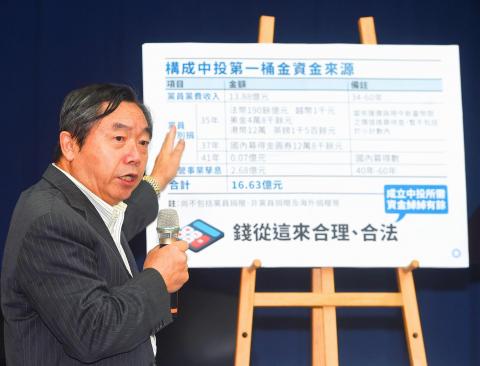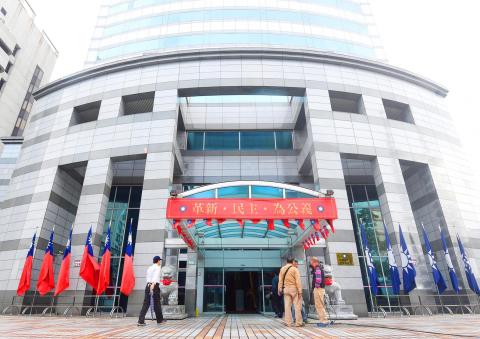The government could take over the Chinese Nationalist Party’s (KMT) headquarters in Taipei’s Zhongshan District (中山) if Central Investment Co (中央投資) — a KMT-funded holding company that owns the building — is found to be an illegally obtained asset, Ill-gotten Party Assets Settlement Committee Chairman Wellington Koo (顧立雄) said.
Koo said the committee is to hold an extraordinary meeting today to determine the status of Central Investment and its spinoff, Hsinyutai Co (欣裕台).
If the two companies are recognized as ill-gotten party assets, properties registered under the two companies — including the KMT headquarters — will be transferred to the government, Koo said during a radio interview on Wednesday.

Photo: Liao Chen-huei, Taipei Times
If Central Investment is ordered to return the property to the state, the building could be used for public purposes, such as a library, after a lease between the KMT and Central Investment expires, Koo said.
There are 18 firms registered under Central Investment, including the Chinese-language China Daily News, a construction company, a hotel in Palau and a British Virgin Island-registered company, and they will have to be returned to the state if their parent company is deemed to be ill-gotten assets, he added.
KMT officials condemned what they said were illegal and unconstitutional acts by the committee, adding that the party would take legal action if Central Investment was declared an ill-gotten asset.

Photo: Liao Chen-huei, Taipei Times
The KMT provided the committee with a number of documents, which it said showed that the founding capital of Central Investment was obtained from legitimate sources, such as party membership fees and political donations, as well as profits generated by a KMT-owned company, KMT Administration and Management Committee director Chiu Da-chan (邱大展) said.
“The KMT has provided proof of the legitimacy of that income, but the committee has not taken this evidence into consideration and [plans to] recognize that income as having been obtained illegally,” Chiu said.
“History will remember if the committee decides to act regardless of the facts and do whatever it wants,” Chiu said.
According to the Act Governing the Handling of Ill-gotten Properties by Political Parties and Their Affiliate Organizations (政黨及其附隨組織不當取得財產處理條例), the KMT should be given one year to declare its assets before the committee determines the status of these assets, he said.
While the committee already recognized Central Investment as a KMT-affiliated organization, it apparently plans to rule on the company’s assets before the KMT has submitted an asset declaration, a move that runs counter to the act, Chiu said.
Central Investment chairman Gordon Chen (陳樹) echoed Chiu’s sentiment, saying the company should be given one year to identify its sources of capital, which he said was collected from at least 16 companies in addition to the KMT.
Prior to that, the committee cannot not make a determination on the company’s assets, Chen said.

SECURITY: As China is ‘reshaping’ Hong Kong’s population, Taiwan must raise the eligibility threshold for applications from Hong Kongers, Chiu Chui-cheng said When Hong Kong and Macau citizens apply for residency in Taiwan, it would be under a new category that includes a “national security observation period,” Mainland Affairs Council (MAC) Minister Chiu Chui-cheng (邱垂正) said yesterday. President William Lai (賴清德) on March 13 announced 17 strategies to counter China’s aggression toward Taiwan, including incorporating national security considerations into the review process for residency applications from Hong Kong and Macau citizens. The situation in Hong Kong is constantly changing, Chiu said to media yesterday on the sidelines of the Taipei Technology Run hosted by the Taipei Neihu Technology Park Development Association. With

CARROT AND STICK: While unrelenting in its military threats, China attracted nearly 40,000 Taiwanese to over 400 business events last year Nearly 40,000 Taiwanese last year joined industry events in China, such as conferences and trade fairs, supported by the Chinese government, a study showed yesterday, as Beijing ramps up a charm offensive toward Taipei alongside military pressure. China has long taken a carrot-and-stick approach to Taiwan, threatening it with the prospect of military action while reaching out to those it believes are amenable to Beijing’s point of view. Taiwanese security officials are wary of what they see as Beijing’s influence campaigns to sway public opinion after Taipei and Beijing gradually resumed travel links halted by the COVID-19 pandemic, but the scale of

A US Marine Corps regiment equipped with Naval Strike Missiles (NSM) is set to participate in the upcoming Balikatan 25 exercise in the Luzon Strait, marking the system’s first-ever deployment in the Philippines. US and Philippine officials have separately confirmed that the Navy Marine Expeditionary Ship Interdiction System (NMESIS) — the mobile launch platform for the Naval Strike Missile — would take part in the joint exercise. The missiles are being deployed to “a strategic first island chain chokepoint” in the waters between Taiwan proper and the Philippines, US-based Naval News reported. “The Luzon Strait and Bashi Channel represent a critical access

Pope Francis is be laid to rest on Saturday after lying in state for three days in St Peter’s Basilica, where the faithful are expected to flock to pay their respects to history’s first Latin American pontiff. The cardinals met yesterday in the Vatican’s synod hall to chart the next steps before a conclave begins to choose Francis’ successor, as condolences poured in from around the world. According to current norms, the conclave must begin between May 5 and 10. The cardinals set the funeral for Saturday at 10am in St Peter’s Square, to be celebrated by the dean of the College